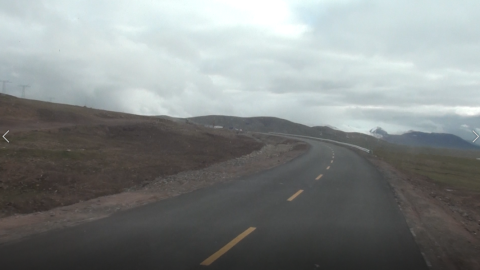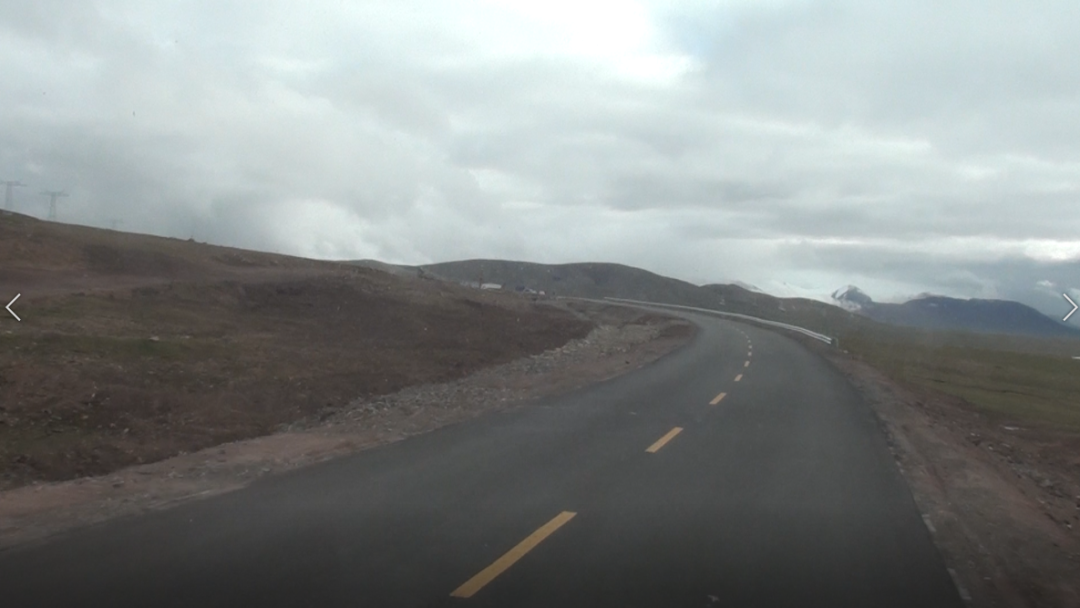
On the Road - Call of the Wild
Time: July 18, 2011
Itinerary: Anduo-Golmud
Departure: Day 85
Tanggula Mountains means "mountains on the plateau" in Tibetan and "high mountains that eagles cannot fly over" in Mongolian.
It is a mountain range running east-west in the central part of the Qinghai-Tibet Plateau. The eastern section is the boundary mountain between Tibet and Qinghai, and the southeastern section extends to Yunling and Nushan in the Hengduan Mountains.
"You can get off the car in a moment!"

Fat Brother suddenly said this, which shocked me. Fat brother who was chatting and laughing just now, could he throw me in the hinterland of the Tanggula Mountains in no man's land and feed me alive to wolves? Logically speaking, it shouldn't be. I stared at Fat Brother in astonishment, and my mood instantly hit rock bottom.
"The Tanggula Mountain Pass is ahead. Go down and take a photo. It's hard to pass by once, so don't leave any regrets." Fatty continued.

Oh, My God!
At that moment, I was moved by Fat Brother’s gentleness and thoughtfulness.
I can't wait to lie on Fat Brother's face, open his big mouth, and take a big sip of the greasy epidermal cells on his big face!
Looking forward, I saw road signs on the flat ground in the distance. The so-called Tanggula Pass is just a small building erected on the flat ground, reminding you that the altitude here is as high as 5231 meters.

Before the car came to a complete stop, I had already jumped out of the car, quickly ran to the sign, and gently touched the ground. With a small sense of ceremony, I had a close contact with this world-famous mountain range.
Are the Tanggula Mountains really ordinary? Of course it's because of the way I hitchhiked. Although I walked farther and faster, I couldn't feel the ancient call from the plateau. I could only live in the ordinary and unremarkable world without even having time to calm down my emotions. I was overwhelmed by other emotions, leaving only the ordinary. A strange sense of déjà vu.
As the car continued to move forward, densely packed metal rods suddenly appeared on both sides of the road, like two rows of guards reaching into the sky. The exposed part of the ground is about two or three meters high. It is dotted with lonely roads in the no-man's land, and it has a sense of sight like the golden cudgel of the Monkey King.
Fat Brother said these are hot rods, and one costs tens of thousands. These metal pillars are unique to the Qinghai-Tibet Line and have unique one-way heat transfer properties.

The Qinghai-Tibet railway and highway have successfully passed through about 550 kilometers of continuous permafrost areas, and plateau permafrost is extremely sensitive to temperature. The frozen soil in the frozen state in winter will expand violently as the temperature decreases, causing patches of ice mounds to bulge on the road surface, which is called frost heave. In summer, as the temperature rises, it melts, which is called melting and settling. It can also easily form water on the road, causing muddying.
Hot rods are used to improve the negative effects of frozen soil caused by temperature fluctuations. They are usually buried 5 meters deep under the roadbed. The entire rod is hollow and filled with liquid ammonia. The working principle of the hot rod is extremely simple: when the roadbed temperature rises, the liquid ammonia is heated and vaporized, rises to the upper end of the hot rod, and conducts heat to the air through the heat sink. The gaseous ammonia is cooled and liquefied into liquid ammonia, and then sinks to the bottom of the rod. .

Simply put, after using hot rods, the permafrost along the Qinghai-Tibet Railway can be kept in a good frozen state, thereby reducing the deformation of the Qinghai-Tibet Highway.
The Qinghai-Tibet Line, where every inch of land is precious, is a sky-high-priced line supported by years of hard work and huge capital investment by the working people, armed police and soldiers.
The cart continued to move forward for dozens of minutes, when a building suddenly appeared on the left side of the Qinghai-Tibet Highway. It was the Tanggula Mountain Military Station, which is famous on the Qinghai-Tibet Plateau.
This military station is located at an altitude of 4,860 meters, about 40 kilometers away from Tanggula Pass. It is the highest military station in China. For many years, the military station has provided food, accommodation, training and other medical support for officers and soldiers performing transportation tasks on the Qinghai-Tibet line. In this inaccessible no-man's land, the dedication of the officers and soldiers of the military station is extremely admirable.

In the lonely hinterland of Tanggula Mountains, these armed police officers and soldiers maintain this loneliness all year round. The young warriors cling to the loneliness and loneliness of their youth in the no-man's land. There is no KTV, no bustling downtown, no neon lights of the city, especially in the long plateau winter, there are only rolling snow-capped mountains and boundless silence. At an age that should have been frivolous and unruly, those young hearts could only leave themselves to this lonely plateau.
In fact, on the Qinghai-Tibet Plateau, the most lonely and lonely people are not the soldiers in the military stations, but the road protection workers. The large vehicle is driving on the Qinghai-Tibet Highway, with a high-voltage transmission line on the left and the Qinghai-Tibet Railway on the right. The three lines run parallel on the snow-covered plateau. And those lonely road guards are the ones who really move people to the point of sobbing silently.

On the road we saw small simple houses beside the railway in no-man's land, and occasionally lonely figures walking around. Fat Brother told me that they were road protectors on the Qinghai-Tibet Railway. Their monthly salary was only more than a thousand dollars. If the mountains were blocked by heavy snow in winter, they could only rely on helicopters to airdrop food to maintain their lonely lives.
My nose suddenly felt sour. What kind of life is that? Weibo's salary is almost unsupervised, but he still sticks to his post responsibly and goes to inspect the railway line on time. It was precisely because they stood alone at their posts that they brought a specially designed oxygen-supply train that traveled safely and smoothly on the vast plateau.

There are also those people who repair roads at any time in no-man's land, and those armed police soldiers who stick to their posts. In peacetime, they are the most lovely people.
In this world, there are always unexpected people, doing ordinary but important and irreplaceable work in circumstances you cannot imagine. All we can do is pay tribute to them.
"Fuck, brother, look at the front, your companion."
Fat Brother suddenly said to me who was looking out the window. I looked ahead and saw a few trekking friends wearing raincoats and riding bicycles with difficulty in the drizzle.

But to be honest, I have no interest in riding friends anymore. After all, I am not interested in cycling, hiking, hitchhiking, or anything else. I am not obsessed with any particular way of traveling. I just like the feeling of being on the road, experiencing different things, meeting different scenery, and meeting different people.
To be honest, compared to the lively Sichuan-Tibet Line, there are very few travelers riding the Qinghai-Tibet Line. At the same time, the Qinghai-Tibet Line is also more likely to make people tired: straight roads, high-definition blue skies and white clouds, and the sheer purity of the road. The loneliness and isolation of the Sichuan-Tibet Line are a lot less fun for me personally than the Sichuan-Tibet Line.

There were many glacial lakes dotted along the way, and the water produced a kind of wild plateau snowfish. It is said that the price is extremely high. The plateau snowfish is boneless but extremely delicious. Since it is produced in the cold water snow lake, the output is very small, and Tibetans generally do not kill animals, so the snow fish is particularly precious.

If one day I want to invite you to come to Hoh Xil to see the sea, please don’t say no, because there are really countless glacial lakes, rivers, lakes and seas in Hoh Xil, a snow-covered plateau.
This is a restricted area for humans, but it is not desolate.
Starting at around 7 o'clock in the morning, after 5 hours of running around, we arrived at Tanggula Mountain Town at noon.
Tanggula Town is located at the northern foothills of Tanggula Mountain. The terrain is high in the south and low in the north. The town is located in the southwest of Golmud City and is an "enclave" of Golmud City.

The territory has overlapping peaks, steep mountains, accumulated glaciers, low valleys, flat beaches and swamps. The average altitude is 4,800 meters, which is a typical plateau landform. The Tuotuo River in the upper reaches of the Yangtze River originates from the Geladandong Snow Mountain, the main peak of Tanggula Mountain (6621 meters above sea level). The Tuotuo River, where the town government is located, is the lowest place in Tanggula Town, with an altitude of 4535 meters.
Tanggula Mountain Town is more like a material transfer station than a small town. It is very much like hiking the 80K on the Medog Road. Many dilapidated and simple buildings are gathered along the Tuotuo River. There are restaurants, car repair shops, gas stations, etc. along the national highway. The town is not big and has all the basic needs of life.

Not far from the edge of the town, there are many round buildings that look like granaries. They are the pumping stations here, storing strategic resources such as oil. Next to where the cart is parked, there is a fat man who often comes to a popular noodle shop. Due to the frozen soil, the house has been broken and scrapped.
Tanggula Mountain Town is the first market town on the Tuotuo River, the western source of the Yangtze River. The Qinghai-Tibet Highway passes through the town. It is also the largest material transfer station in the uninhabited land of Hoh Xil. The small town is covered with clouds, and the desolation also reveals vitality.

At around 1 o'clock in the afternoon, after eating, drinking and resting in Tanggula Mountain Town, we hit the road again. From here, you will enter the real Hoh Xil (Qinghai) Nature Reserve. The Qinghai-Tibet Highway is the eastern edge of the reserve.
